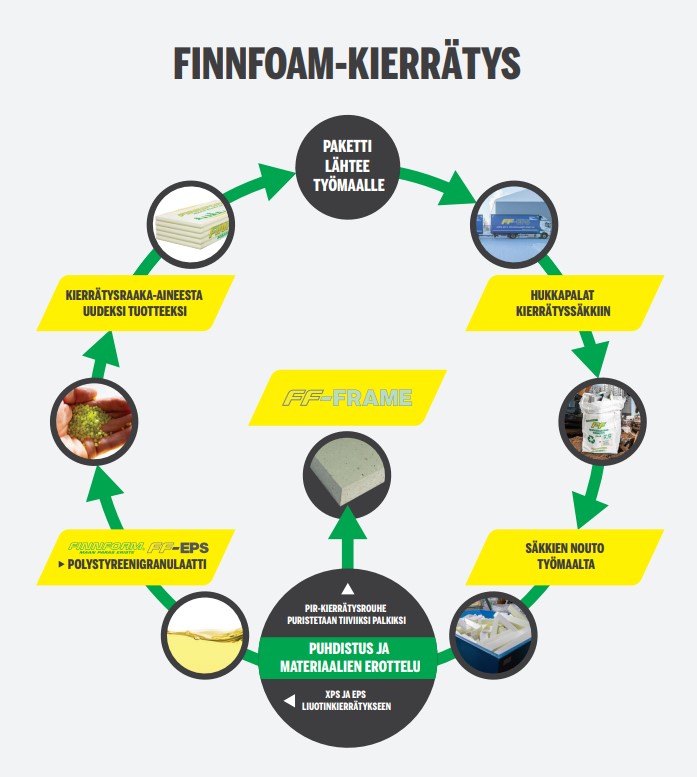Solvent-based recycling of polystyrene
Groundbreaking 10-million euro chemical plastic recycling plant to be built in Salo – innovative solvent based on fruit
Finnfoam is building a facility designed for chemically recycling polystyrene in Salo, where used and even dirty expanded plastic insulation can be recycled in an energy efficient and cost-effective manner to be used as raw material for insulation products. Finnfoam has sought to patent the recycling process and the environmentally friendly solvent used during it.
Investing in circular economy, the insulation manufacturer Finnfoam is building a pilot plant in Salo for chemically recycling polystyrene, i.e., XPS and EPS insulation materials. The total value of the investment will be more than 10 million euros.
“We are constantly developing our processes to make them more resource efficient and environmentally friendly, and we aim to identify solutions based on circular economy. With this chemical recycling plant, we can increase the amount of recycled materials used in the manufacture of our insulation products”, says Henri Nieminen, Managing Director at Finnfoam.
Purification process plays a key role
The purity of fractions is a fundamental challenge in recycling, and the same applies to recycled plastic waste. Thermal insulation offcuts collected from worksites in particular are often dirty; the materials may be covered in sand, concrete, or urethane adhesive residue, for example.
The development of the equipment used for the purification system has been an essential part of the development of the recycling process. The industrial equipment has been developed based on small-scale versions created during the prototype stage. During the actual recycling process, polystyrene is dissolved into a fully liquid form using a new, innovative solvent, after which any impurities can be filtered out easily.
The solvent is purified and then vaporized and returned to the process cycle, and the re-solidified polystyrene is granulated to be used as raw material for manufacturing insulation products.
The plant to be constructed on Finnfoam’s factory site is currently in the piling stage. The completed plant will comprise a 12-meter cooling tower, among other features. The facility is expected to be completed by the end of 2023.

Patents sought for the fruit-based solvent mixture and recycling system
The chemical process, including the purification and vaporization equipment and solvents, is the result of a three-year development process. The development was carried out in long-term cooperation between Finnfoam and Brightplus. The initial idea was to determine the best method for recycling a thermoplastic polymer, such as polystyrene, as energy efficiently as possible.
“A chemical recycling process based on dissolution is much preferable to traditional mechanical processes because it makes it easier to remove physical impurities from the resulting solution. And once the plastic has been dissolved and broken down into its constituent building blocks, they can be reutilized energy-efficiently as material for the production of insulation products”, says Jarkko Leivo from Brightplus.
It was essential to identify the best solvent option to retain the polymer structure within the liquified polystyrene, which allows for the easiest recovery of the raw material. “The process uses a mixture of natural solvents based on certain edible fruits,” Leivo says. Patent has been sought for both the solvent and the actual recycling process.
Boosting logistics through an acquisition
In addition to the purity of the fractions, the collection of a sufficient volume of material is also a significant challenge in the recycling of plastics. Finnfoam has resolved this issue by purchasing 50 percent of the shares in PS Processing Oy from Laitila. The company specializes in collecting and recycling EPS plastic, which offers Finnfoam an existing network for its recycling operation.
“This acquisition allows us to ensure sufficient access to recyclable materials”, Nieminen sums up.
PS Processing Oy has more than 10 years of experience of recycling polystyrene, and challenges have always been posed by impurities in the recycled materials. “The technology developed by Finnfoam is well-suited for the collection of polystyrene, as the issues regarding purity are eliminated”, says Santeri Sulo, co-owner of PS Processing Oy.
Previously, PS Processing sent significant quantities of material to other countries for recycling. As the material can now be circulated within the domestic market, its carbon footprint will become significantly smaller as transport needs are reduced.

Recycling solves various issues linked with plastics
We at Finnfoam believe that plastic is often criticized unnecessarily, as it is a safe, durable, and affordable material. For example, in terms of its properties and resource efficiency, plastic is an unparalleled material for thermal insulation products where safe moisture performance is key. Many of the issues pertaining to plastic are primarily caused by what happens with the material once it has been used.
Plastic is a genuinely recyclable and durable good, and effective recycling of plastic offers a solution to many of the issues the material is associated with”, Nieminen sums up
